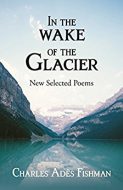 Charles Adès Fishman
Charles Adès Fishman
In the Wake of the Glacier: New Selected Poems
Kasva Press
Reviewer: Ann Wehrman
In the Wake of the Glacier: New Selected Poems, a rich compilation of Fishman’s poetry since 1968, showcases the author’s exquisite personal voice and enviable mastery of craft. With precise eye and profound conscience, Fishman pays tribute to beauty, love, and life in a world where loss, horror, and death constantly threaten to tip the scales.
In the Wake of the Glacier is presented chronologically in ten sections (273 pages of poems) beginning with work from Fishman’s 1977 Mortal Companions and moving through the years to selections from In the Language of Women, a 2011 publication. Additionally, In the Wake of the Glacier includes two final sections, “Previously Uncollected Poems” and “Nine Recent Poems.” The following words by Gretel Ehrlich open the book significantly: “The retreat and disappearance of glaciers…means we’re burning libraries and damaging the planet, possibly beyond repair. Bit by bit, glacier by glacier, rib by rib, we’re living the Fall.”
The symbolism of humanity’s fall from grace rings portentously in this time of increased social change, in which nations, cultures, ideologies, and races must move from their established patterns, must bend, sometimes break, and flow into new ways of being. It is said that the world is at the end of a cosmic cycle, an immense shift that humans and the Earth cannot escape, and the wisdom teachers teach that this is a natural cycle, not the end of life but an alteration and opportunity for growth. This change does not occur gently; death and rebirth bring great loss and pain. Fishman testifies to the pain of increasing darkness while paying homage to beauty, love, and goodness found in nature as well as in human hearts and lives. He does not reassure the reader or point the way to renewal; instead, he expresses his understanding of what he has lived through and what this time in the world seems to reveal.
On that note, many of the poems in this collection are concerned with the joyless or somber aspects of life, ranging in topic from an individual human’s inner experience of tragedy to the collective atrocity of the Holocaust (which the author explores in depth). Many of the poems express a tone or specific theme of dissolution, lamenting loss and passing away. The losses range from life, cultural values, and national boundaries to youth (for example, in “Blue Bicycles”), a beloved spouse and aged parents (as in “My Father Singing”), and animal species (as in “What Killed the Heron”).
However, Fishman constantly restores a balance between darkness and light by maintaining the possibility of healing through the power of love. In this vein, “Beach after Rain,” one of the “Previously Uncollected Poems,” and the piece from which the book’s title is taken, answers Ehrlich’s words with simple, stunning affirmation of the life principle and luminous description:
Here was the place I had looked for
the way one relearns life’s sweetness
In this space, the smallest act would taste
of ritual: to breathe, the first gift after drowning
I would learn each dune and lake
I would dream the world new again
as it was in the wake of the glacier.
In “Blue Bicycles,” Fishman explores the awakening of consciousness through a young boy’s internal perception of his parents: “The child dreams he is gliding in a park / — his father runs behind, steadying, / steadying, and then moves off The bicycle / rises under him like a star.” Fishman uses the bicycle as a trope to show the youth’s movement and development: “The wheels are coldly beautiful… / the child sees how right they are / for moving: he could float with them.” More than a mere secular tribute to youth, family, and natural growth, “Blue Bicycles” is bright with vison, as in the final lines:
He begins to see
how the night empties light into time,
how silence opens — a blue flower — in the brain:
reason enough to make his soul climb, wheeling faster
and faster
In “My Father, Singing,” the speaker pays homage to the romance and fidelity his parents shared:
Last midnight of the age
and my ageless father sings:
How wonderful you are!
The song is ancient,
but he delivers it with conviction,
Though the hour is primed for grief,
this is no time for tears. If she had lived,
they would have sung this song
together […]
. . .
My father sings, as if death might vanish
with a song.
In “What Killed the Heron,” lamenting human destruction of nature, Fishman writes,
White as a cabbage butterfly, the heron exists
in a seashore garden: the picture of utility
and composure. What are the reeds whispering,
whispering? Do they sense that the plume of yellow smoke
from the inlet incinerator is truly the secret tail
of the great American bird?
To be a parchment-white spider under a cloud of thistle seeds!
Nature, if you could talk to us again maybe
we would be made whole.
The wisdom teachings argue that as the current age winds down and dissolves, humanity and the Earth simultaneously move forward toward rebirth. Although it may feel like evening, morning will come again in the natural cycling of life. Perhaps, if that is true, Fishman’s melancholy songs are fitting at this time, like a nightingale’s lament at dusk. Sometimes the poems convey warmth, yet often they express a dry, cold malignancy, as is the case with many of the poems that address the Holocaust. The poet chronicles the setting sun in today’s world, unflinching in his exposé of the vice sometimes present in human souls and actions, while paying tribute to redeeming beauty and love through an elegant, virtuosic use of diction and style.

